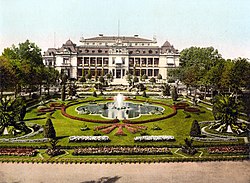Palmengarten
| This article needs additional citations for verification. (May 2016) (Learn how and when to remove this template message) |
| Palmengarten | |
|---|---|
| Palmengarten | |

Main entrance at Siesmayerstraße
|
|
| Detail of a town map created in 1887 | |
| Location | Frankfurt, Hesse, Germany |
| Coordinates | 50°7′25″N 8°39′20″E / 50.12361°N 8.65556°ECoordinates: 50°7′25″N 8°39′20″E / 50.12361°N 8.65556°E |
| Area | 22 ha (54 acres) |
| Opened | March 16, 1871 |
| Founder | Siesmayers Actiengesellschaft |
| Designer | Heinrich Siesmayer |
| Etymology | German word for ″palm garden″ |
| Owned by | Frankfurt |
| Visitors | 596,934 (in 2015)[1] |
| Open | February-October: 9 am–6 pm November-January: 9 am–4 pm |
| Status | open |
| Parking | underground car park |
| Public transit access | Bockenheimer Warte (Underground, tramway & Bus), Westend (Underground & Bus), Palmengartenstraße (Bus) |
| Website | www |
The Palmengarten is one of two botanical gardens in Frankfurt am Main, Germany. It is located in the Westend-Süd district. It covers a surface of 22 hectares.
Like many public sites in Frankfurt, it was privately financed and implemented by the architect Heinrich Siesmayer. Work was completed in 1871 and opened to the public. One colorful visit was from the American entertainer Buffalo Bill who brought his Western show in 1890. In 1931, it was taken over by the city of Frankfurt but was later transferred to the American occupation authorities after World War II. When the Palmengarten was returned to the city's hands in the sixties, a major reconstruction effort was begun. Halls destroyed in the war were redeveloped and expanded. In 1992 the reconstruction finished completely and the Palmengarten shined in its new form.
Directly next to the area of the Palmengarten is the Frankfurt Botanical Garden, which belongs to the biology department of Johann Wolfgang Goethe-Universität Frankfurt.
The botanical exhibits are organized according to their origin in free-air or climatized greenhouses, which also contain numerous tropical and subtropical plants.
See also[edit]
| Wikimedia Commons has media related to Palmengarten Frankfurt. |
- Botanischer Garten der Johann Wolfgang Goethe-Universität Frankfurt am Main
- List of botanical gardens in Germany
References[edit]
- ^ "statistik.aktuell. Besuch der Frankfurter Kultur- und Freizeiteinrichtungen im Jahr 2015" (PDF) (in German). Retrieved 2016-05-28.
| This Hesse location article is a stub. You can help Wikipedia by expanding it. |
| This article related to a park or garden in Germany is a stub. You can help Wikipedia by expanding it. |


